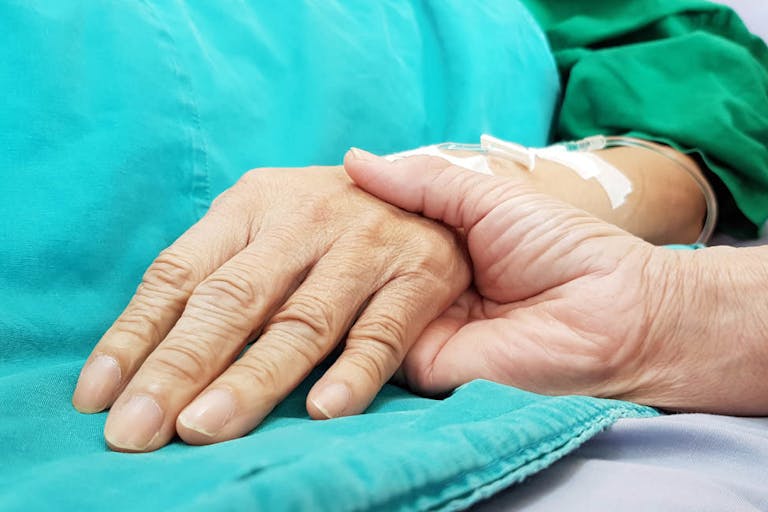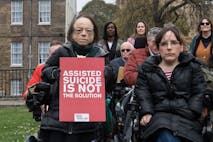
Texas library can keep sexually explicit material from minors... for now
Sheena Rodriguez
·
Practitioner calls medically-assisted killing an ‘uplifting… privilege’
A doctor from the UK who has directly killed 10 people so far through “intravenous practitioner administration” has said that ending the lives of people in Australia is a “privilege.”
Her language markets suicide as brave and dignified.
A euthanasia practitioner from the UK now living in Australia claims lethally injecting drugs into an individual to end his or her life is “quick… painless… [and] dignified.”
This practitioner was inspired to end people’s lives by witnessing her own mother’s suffering prior to her death.
She claims only certain doctors are strong enough to deliberately end people’s lives when they are suffering.
She says ending people’s lives was difficult for her at first, and admits that she still needs to remind herself of her reasons for doing it, which “helps [her] through.”
In reality, experts have noted that many people who die through medically-assisted killing experience drowning while externally appearing to have no pain due to the use of paralytic agents.
Polling shows that when UK citizens learn what assisted suicide truly involves, support for it plummets.
Dr. Emma Boulton, a 59-year-old who trained and worked in the UK as a general practitioner before moving to Sydney, Australia, has called physician-assisted death a “very dignified” death.
She now assesses people who have applied for euthanasia to determine if their lives are still worth living and ‘helps’ them die through intravenous practitioner administration of drugs — which involves injecting an individual with an anaesthetic before injecting them with a neuromuscular blocking agent, resulting in paralysis. If not lethal on its own, the practitioner can administer further drugs.
“It’s quick, it’s painless, it’s very dignified,” she claimed.
Boulton, who is pushing for the legalization of assisted death in the UK, said:
When people go, there’s often this palpable sense of relief, and it can be very uplifting, because you see this person who’s deeply, deeply suffering in lots of ways, and they’ve made this really gutsy decision that they want to exit this world on their own terms, and they do so.
Boulton wants people to believe that the product she’s selling is worth buying. She recently took part in an event at Parliament to support groups who want to legalize assisted death, including Humanists UK and My Death My Decision.
While what Boulton practices — euthanasia (killing patients through IV drugs) — is not a part of the UK Terminally Ill Adults (End of Life) Bill, she hopes to help pass the bill, which would allow doctors to determine whose lives are worth living and then prescribe them a deadly drug cocktail to take themselves at home.
Boulton further claimed that killing people is only for the strongest of doctors, noting that it is “not work that’s for everybody. You have to be pretty resilient and comfortable in your own skin and be able to work with these things.”
Some doctors, she believes, are simply not mentally strong enough to do what she considers “very moving” work.
“I consider it a tremendous privilege to be involved in it and be able to assist people to determine their fate, particularly when they’re going through intolerable suffering,” she said.
However, she admits that it took her a few tries before she became comfortable with killing people.
“For me, personally, particularly for the first few (deaths) that I was involved with, I felt very strange. It’s like, ‘what have I done?’ You know, I’ve spent my whole life prolonging life, and now in my hand, you know, somebody has died as a result of my actions,” she said.
“So it’s quite an odd thing to have to deal with, but the way that I get around it is by knowing, understanding that I am alleviating suffering, and I’m acting on the patient’s express wishes, and that really helps me through,” she added, her ambivalence and difficulty with her “work” manifesting in her remarks.
Boulton said it was her mother’s wish to end her own life that inspires her to do what she does:
What I witnessed with my mother is not that different from the suffering that I see in my assisted dying work.
Article continues below
Dear Reader,
Have you ever wanted to share the miracle of human development with little ones? Live Action is proud to present the "Baby Olivia" board book, which presents the content of Live Action's "Baby Olivia" fetal development video in a fun, new format. It's perfect for helping little minds understand the complex and beautiful process of human development in the womb.
Receive our brand new Baby Olivia board book when you give a one-time gift of $30 or more (or begin a new monthly gift of $15 or more).
But the good thing is that if they meet the eligibility criteria in our assessment then the patients that I see (in Australia) can access the assisted dying process, whereas people in the UK can’t.
Research shows that dying by lethal injection may be anything but quick and painless. A lethal injection of a paralytic drug may cause the person to actually end up drowning while outwardly appearing to be in no pain, while the death can actually be extremely painful. It can also take hours to die.
Dr. Joel Zivot, an associate professor of anesthesiology and surgery at the Emory School of Medicine, is also considered an expert on “physician participation in lethal injection.” He regularly campaigns against the use of lethal injection for execution in the United States, having witnessed it firsthand multiple times.
In an op-ed for The Spectator, Zivot points out that assisted suicide and euthanasia actually bring about a painful — not painless — death.
“The death penalty is not the same as assisted dying, of course. Executions are meant to be punishment; euthanasia is about relief from suffering,” he said. “Yet for both euthanasia and executions, paralytic drugs are used. These drugs, given in high enough doses, mean that a patient cannot move a muscle, cannot express any outward or visible sign of pain. But that doesn’t mean that he or she is free from suffering.”
He explained that a man named Marcus Wellons was executed using the same drugs frequently used in assisted death.
“Wellons’s autopsy revealed that his lungs were profoundly congested with fluid, meaning they were around twice the normal weight of healthy lungs,” he said. “He had suffered what is known as pulmonary edema, which could only have occurred as he lay dying. Wellons had drowned in his secretions. Yet even my medical eye detected no sign of distress at his execution.”
Despite the praises from euthanasia/assisted suicide practitioners, doctors in the UK are not on board with legalizing assisted death. About 1,000 doctors signed a letter urging MPs to vote against the assisted death bill, which they called “simply not safe” and warned that it “poses a real threat to both patients and medical workforce.”
A 2024 poll in the UK found that while citizens largely support medically-assisted killing in principle, once they learn what the process actually involves, support for it plummets. The Daily Mail reported:
The survey of more than 5,000 people also reveals a widespread misunderstanding of what assisted dying means, with four in ten people unable to identify what will happen if the law is changed….
Almost 20 per cent of people wrongly believe assisted dying includes hospice care and over half think it includes ‘life-prolonging treatment’, the polling found….
Six in ten people agree that it is ‘impossible’ to create safeguards that would prevent the vulnerable from being coerced into ending their lives, it found. Meanwhile 58 per cent are concerned that it is ‘inevitable’ that some of the most vulnerable in society, including the elderly and disabled, will feel pressured into an assisted death.
It found that when presented with ten basic arguments against assisted suicide – based on experiences from other countries such as Canada where the practice is allowed – support collapses.
In this case the proportion of ‘supporters’ who did not switch to oppose or say ‘don’t know’ fell to just 11 per cent, the polling found. Support fell in every social category by between 17 and 49 percentage points.
Boulton believes doctors who refuse to kill their patients are just afraid. “I think objection is based in fear and I think a proper legislative framework would actually protect people and their practitioners,” she said, adding, “[P]eople are worried about killing off granny because they want to get her money and that she’s helpless and she can’t make decisions for herself, and it’s not like that at all.”
However, research from Oregon where assisted death is legal shows that many people choose it because they don’t want to be a “burden” on their family members — indicating that many truly do feel pressure to end their lives.
Live Action News is pro-life news and commentary from a pro-life perspective.
Contact editor@liveaction.org for questions, corrections, or if you are seeking permission to reprint any Live Action News content.
Guest Articles: To submit a guest article to Live Action News, email editor@liveaction.org with an attached Word document of 800-1000 words. Please also attach any photos relevant to your submission if applicable. If your submission is accepted for publication, you will be notified within three weeks. Guest articles are not compensated (see our Open License Agreement). Thank you for your interest in Live Action News!

Sheena Rodriguez
·
Issues
Sheena Rodriguez
·
Guest Column
Right to Life UK
·
Issues
Bridget Sielicki
·
International
Cassy Cooke
·
Issues
Sheena Rodriguez
·
Human Interest
Nancy Flanders
·
Investigative
Nancy Flanders
·
Pop Culture
Nancy Flanders
·
Human Interest
Nancy Flanders
·
Human Interest
Nancy Flanders
·